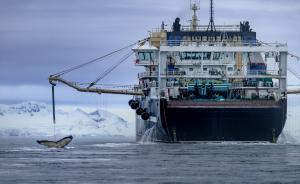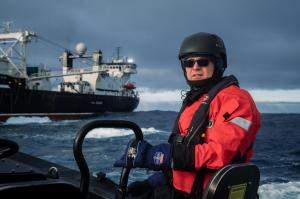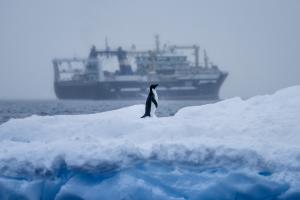Sea Shepherd Returns to Antarctica to Expose the Growing Threat of Krill Fishing

Industrial krill vessel fishing among feeding whales in Antarctica. Photo by Youenne Kerdavid/Sea Shepherd.
Sea Shepherd has returned to the Southern Ocean for its third consecutive campaign to monitor and expose the impact of industrial krill fishing in Antarctica.
Sea Shepherd has returned to the Southern Ocean for its third consecutive campaign to monitor and expose the impact of industrial krill fishing in Antarctic waters. Operating later into the season and deeper into krill fishing territory than ever before, the organization is documenting interactions between krill super trawlers and the region's abundant marine life, including fin whales, humpbacks, and southern right whales.
In the first days of the campaign, Sea Shepherd encountered massive feeding aggregations of whales near Coronation Island. “On Tuesday we woke up to a feeding frenzy. Over 500 massive fin whales surrounding the our ship, feeding on krill,” said Captain Alex Cornelissen, Sea Shepherd Global CEO. “None of us on board had ever seen anything like it, not even the returning crew from last year. And still, trawlers were there, fishing right in the middle of it.”
Krill, tiny crustaceans that form the base of the Antarctic food web, are being netted by large vessels from China, Norway, and Ukraine. These trawlers often operate in areas densely populated by whales, penguins, and seals. Last season, at least three whales were reported caught in krill nets, highlighting the risk this activity poses to Antarctic marine life.
To support its monitoring efforts, Sea Shepherd has brought onboard scientists tasked with collecting evidence on the impact of industrial krill fishing. The data gathered includes the frequency of trawlers operating in active feeding zones, proximity to marine mammals, and behavioral changes in wildlife. This information will be used to increase pressure on the Commission for the Conservation of Antarctic Marine Living Resources (CCAMLR) – the international body responsible for managing the krill fishery – to prioritize conservation measures, including the creation of marine protected areas.
“We meticulously navigated our small boat to keep the safe distance between us and the wildlife,” added Cornelissen. “Only to see the krill vessels drag their net through the middle of all this activity.”
One Ukrainian vessel was caught on camera doing just that. So was a Norwegian company responsible for more than half of all krill extracted from Antarctica.
“It’s outrageous that this is allowed. This area is bursting with life. It should be protected, not plundered,” Cornelissen added.
What’s happening in Antarctica is driven by decisions made thousands of kilometers away, in corporate boardrooms fueling global supply chains.
Krill isn’t being fished to feed people. It’s used in pet food, fish feed for salmon farms, and omega-3 supplements, despite the availability of plant-based alternatives. The industry may operate at the edge of the world, but the demand is global.
To confront that demand, Sea Shepherd has launched SaveKrill.com, a resource that enables supporters to take action. From anywhere in the world, people can contact retailers that stock krill-based products and call on them to stop supporting this industry.
“Every time someone buys a krill supplement, they’re supporting the destruction of Antarctica,” said Cornelissen. “It has to stop.”
The more voices are raised, the harder it becomes for companies to turn a blind eye. This campaign doesn’t end with what Sea Shepherd witnesses at sea. It continues wherever decisions are made to profit from Antarctic exploitation.
That includes CCAMLR, the body tasked with managing and protecting Antarctic marine life. Despite years of scientific evidence and mounting ecological pressure, CCAMLR has failed to establish the protections these waters urgently need. In 2024, proposals to create new marine protected areas were once again delayed, as consensus slipped further out of reach.
But not all pressure has gone unanswered. In late 2023, a proposal to increase krill catch limits was successfully blocked following public outcry sparked by footage released from Sea Shepherd’s previous campaign. While this outcome was seen as a step forward, Sea Shepherd stresses that more comprehensive protection is needed.
“I cannot think of an area in the ocean with a higher need for protection than where we are now,” said Cornelissen. “The creation of a marine reserve north of Coronation Island and including the Antarctic Peninsula should be a top priority.”
Sea Shepherd’s ongoing presence in the Southern Ocean aims to fill the monitoring gap left as tourism and research vessels depart for the season due to worsening weather and ice conditions. The organization will continue to observe and document krill fleet activity and provide data to policymakers and the public.
Heather Stimmler
Sea Shepherd Global
+33 9 77 19 77 42
media@seashepherdglobal.org
Legal Disclaimer:
EIN Presswire provides this news content "as is" without warranty of any kind. We do not accept any responsibility or liability for the accuracy, content, images, videos, licenses, completeness, legality, or reliability of the information contained in this article. If you have any complaints or copyright issues related to this article, kindly contact the author above.
Complete Roofing Solutions Highlights Long-Term Value of Roof Maintenance Plans
Non-Surgical Robotic Laser Spinal Decompression Offers Life-Saving Hope to Chronic Pain Sufferers in Ottawa
Bikago Motorbike and Scooter Rentals Achieves TripAdvisor Top 10 Global Tourism Ranking
Więcej ważnych informacji
 Jedynka Newserii
Jedynka Newserii

 Jedynka Newserii
Jedynka Newserii

Handel

Mercosur to tylko wierzchołek góry lodowej. UE ma ponad 40 umów handlowych, które mogą destabilizować rynek rolny
Umowa handlowa między UE a krajami Mercosur może znacząco zaburzyć konkurencję na rynku rolnym i osłabić pozycję unijnych, w tym polskich, producentów – ostrzegają rolnicy i producenci żywności. Umowie sprzeciwia się część krajów unijnych, które domagają się klauzuli ochronnych oraz limitów importowych. – Problemem jest jednak nie tylko ta konkretna umowa. Chodzi o cały system wolnego handlu, który się kumuluje z dziesiątek innych porozumień – podkreśla Andrzej Gantner, wiceprezes Polskiej Federacji Producentów Żywności.
Firma
Dzięki zdalnej weryfikacji tożsamości z wykorzystaniem AI firmy zminimalizowały liczbę oszustw. Rozwiązania wykorzystuje głównie sektor finansowy

Z najnowszych danych Eurostatu wynika, że w 2024 roku 5,9 proc. polskich firm korzystało z rozwiązań z zakresu sztucznej inteligencji. W 2023 roku był to odsetek na poziomie 3,67 proc. Wciąż jednak jest to wynik poniżej średniej unijnej, która wyniosła 13,48 proc. Jednym z obszarów, który cieszy się coraz większym zainteresowaniem wśród przedsiębiorców, jest weryfikacja tożsamości przez AI, zwłaszcza w takich branżach jak bankowość, ubezpieczenia czy turystyka. Jej zastosowanie ma na celu głównie przeciwdziałać oszustwom i spełniać wymogi regulacyjne.
Prawo
Daniel Obajtek: Własne wydobycie i operacyjne magazyny to filary bezpieczeństwa. Zgoda na magazyny gazu poza krajem to rezygnacja z suwerenności energetycznej

Były prezes Orlenu ostrzega przed zmianami w ustawie o zapasach ropy naftowej, produktów naftowych i gazu ziemnego. Jego zdaniem przygotowana przez rząd nowelizacja tzw. ustawy magazynowej i ujednolicanie unijnej polityki energetycznej to zagrożenie dla bezpieczeństwa energetycznego Polski. W jego opinii tylko silna spółka narodowa, własne wydobycie, krajowe magazyny i zbilansowany miks energetyczny zapewnią Polsce bezpieczeństwo i konkurencyjność.
Partner serwisu
Szkolenia

Akademia Newserii
Akademia Newserii to projekt, w ramach którego najlepsi polscy dziennikarze biznesowi, giełdowi oraz lifestylowi, a także szkoleniowcy z wieloletnim doświadczeniem dzielą się swoją wiedzą nt. pracy z mediami.






![Nestlé w Polsce podsumowuje wpływ na krajową gospodarkę. Firma wygenerowała 0,6 proc. polskiego PKB [DEPESZA]](https://www.newseria.pl/files/1097841585/fabryka-nesquik_1,w_85,r_png,_small.png)



.gif)

 |
| |
| |
|